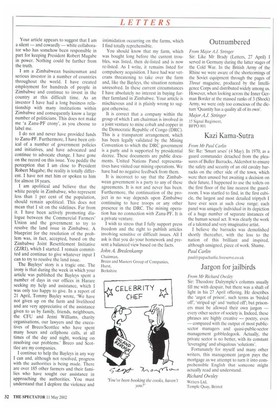Your article appears to suggest that I am a silent
— and cowardly — white collaborator who has somehow been responsible in part for keeping President Robert Mugabe in power. Nothing could be further from the truth.
I am a Zimbabwean businessman and serious investor in a number of countries throughout the world. I have created employment for hundreds of people in Zimbabwe and continue to invest in the country at this difficult time. As an investor I have had a long business relationship with many institutions within Zimbabwe and consequently know a large number of politicians. This does not make me 'a Zanu-PF crony', as you choose to label me.
I do not and never have provided funds to Zanu-PF. Furthermore, I have been critical of a number of government policies and initiatives, and have advocated and continue to advocate change. I have gone on the record on this issue. You peddle the perception that I am close to President Robert Mugabe; the reality is totally different. I have not met him or spoken to him for almost 18 years.
I am apolitical and believe that the white people in Zimbabwe, who represent less than 1 per cent of the population, should remain apolitical. This does not mean that I sit on the sidelines. Far from it. I have been actively promoting dialogue between the Commercial Farmers' Union and the government to try to resolve the land issue in Zimbabwe. A blueprint for the resolution of the problem was, in fact, accepted, based on the Zimbabwe Joint Resettlement Initiative (ZJRI), which I started. I remain committed and continue to give whatever input I can to try to resolve the land issue.
The Bayleys' story is a tragic one. The irony is that during the week in which your article was published the Bayleys spent a number of days in our offices in Harare seeking my help and assistance, which I was only too happy to give. In a report of 21 April, Tommy Bayley wrote, 'We have not given up on the farm and livelihood and are very appreciative of the assistance given to us by family, friends, neighbours, the CFU and Jenni Williams, charity organisations, our lawyers and the executives of Breco/Scottlee who have spent many hours and cellphone calls, at all times of the day and night, working on resolving our problems.' Breco and Scottlee are my companies.
I continue to help the Bayleys in any way I can and, although not resolved, progress with the authorities is being made. There are over 185 other farmers and their families who have sought our assistance in approaching the authorities. You must understand that I deplore the violence and intimidation occurring on the farms, which I find totally reprehensible.
You should know that my farm, which was bought long before the current troubles, was listed, then de-listed and is now re-listed. As I write, it remains listed for compulsory acquisition. I have had war veterans threatening to take over the farm and, like the Bayleys, the situation remains unresolved. In these current circumstances have absolutely no interest in buying further farmland in Zimbabwe. Your article is mischievous and it is plainly wrong to suggest otherwise.
It is correct that a company within the group of which I am chairman is involved in a joint venture to mine cobalt and copper in the Democratic Republic of Congo (DRC). This is a transparent arrangement, which has been legally validated by the Mining Convention to which the DRC government is a party and is supported by presidential decree. These documents are public documents. United Nations Panel representatives have visited our mining operations. We have had no negative feedback from them.
It is incorrect to say that the Zimbabwean government is a party to any of these agreements. It is not and never has been. Furthermore, the continuation of the project in no way depends upon Zimbabwe continuing to have troops or any other presence in the DRC. The mining operation has no connection with Zanu-PF. It is a private venture.
I wish to stress that I fully support press freedom and the right to publish articles involving sensitive or difficult issues. All I ask is that you do your homework and present a balanced view based on the facts.
John A. Bredenkamp
Chairman, Breco and Masters Group of Companies, Hurst, Berkshire






































































 Previous page
Previous page